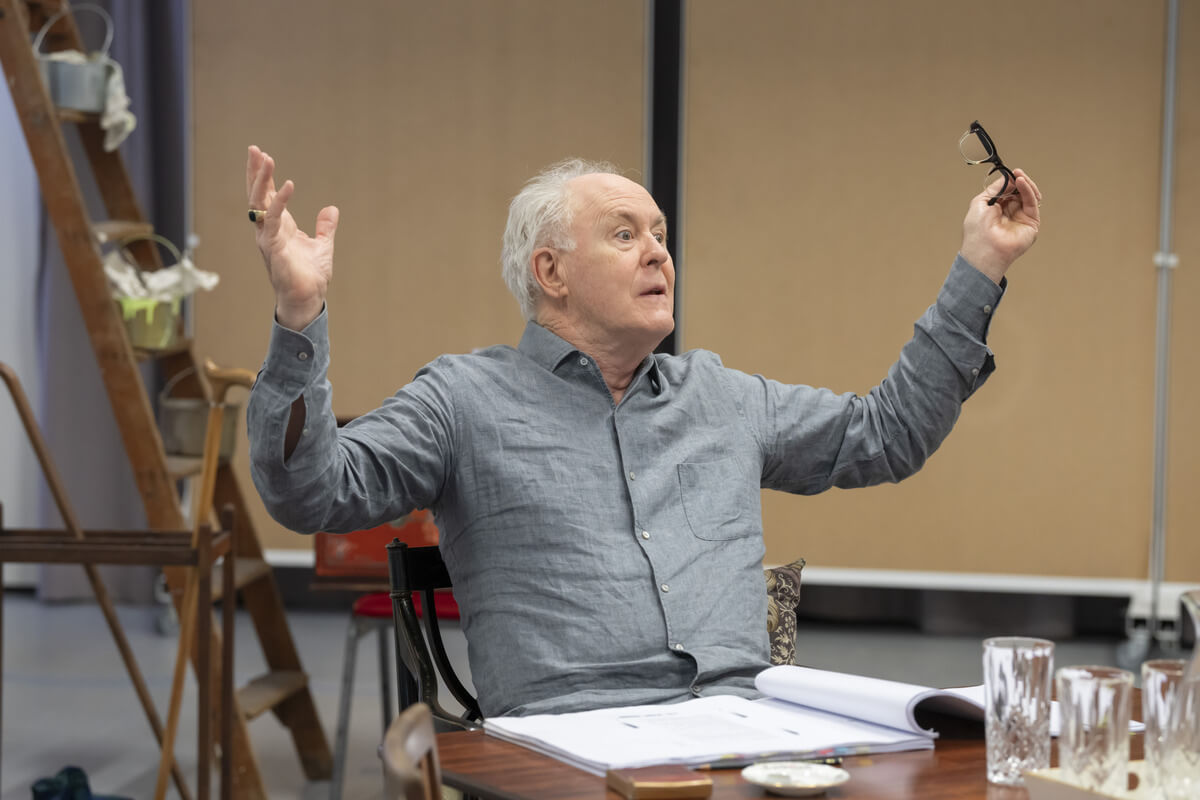Anyway, the plot: Bob and Fiona are having an affair. Their spouses Teresa and Frank don’t know about Bob and Fiona’s affair. William and Mary aren’t having an affair with anybody, but Frank thinks Mary is having an affair with Bob, not his wife Fiona… And we’re off.
The Foster’s and the Phillip’s morning routines play out simultaneously on Julie Godfrey’s set, merging two households - of polar opposite class and decor - seamlessly and simply (a three person sofa is two-thirds the Foster’s and one-third the Phillips’ for example). Alan Strachan’s staging fits beautifully into Godfrey’s set interweaving the actors within an inch of each other whilst their characters are completely unaware of their prescience. This synthesis of set and staging was something that only theatre could provide, and was magical at times.
However, the play’s most famous scene (where the Featherstones are having dinner simultaneously with one couple on a Thursday and the other on the following Friday) was, oddly, the least effective piece of staging in the show. Strachan made the decision to transition from one scene to another rather blatantly, which made one feel like you weren’t looking into their lives any more but that you were watching some actors trying to be funny.
Special mention must go to Nick Le Prevost as the bumbling, forgetful Frank - he’s something special. Le Prevost spends most of the play in his very own ‘Who Done It’, an umming and arring Poirot, but also managed to bring a tear to my eye at two separate points when he came dangerously close to discovering that his wife had been having an affair. This is more impressive, because as he walks on stage you expect to laugh, you know there’s a funny coming — but for all that pretence he continually surprised with his comic timing and change of delivery and tone. This was a delightful, masterful comedy performance and I’d encourage anyone reading this to watch any show with him in in the future.
The piece now 47 years after its first production teeters on the edge of being an outdated, period piece with a discussion on the traditional marriage spheres no longer grabbing my attention. However, the prescience of very 60s technology within the show actually allows for a great deal of reflection on how different life really is now. Dinners wouldn’t be organised over phone calls now, but Facebook Events, and affairs are probably much harder things to organise nowadays with the amount of ways you can be found out. What can you do.
How the Other Half Loves is a brilliant piece of writing and there is so much good work in this production, but ultimately the performances don’t always match the script's potential and therefore there are too many occasions where the piece slows down to almost a halt. Le Provost, though…

 It’s the 60s. Alan Ayckbourn’s comedy presents three couples: Frank and Teresa Foster (old, stuffy and, in Frank’s words, married “because it’s better than nothing”), Bob and Theresa Phillips (burdened with a child, and burdened by each other for most of the play, before passionately resolving their differences in the bedroom) and William and Mary Featherstone (you really pull for these two: Mary is scared of social situations, and William has spent all his life trying to make Mary less scared of social situations, but Mary is still really scared of social situations..and sherry).
It’s the 60s. Alan Ayckbourn’s comedy presents three couples: Frank and Teresa Foster (old, stuffy and, in Frank’s words, married “because it’s better than nothing”), Bob and Theresa Phillips (burdened with a child, and burdened by each other for most of the play, before passionately resolving their differences in the bedroom) and William and Mary Featherstone (you really pull for these two: Mary is scared of social situations, and William has spent all his life trying to make Mary less scared of social situations, but Mary is still really scared of social situations..and sherry).



 After last year’s commercial success IMPOSSIBLE returns to the Noël Coward Theatre, where a gang of illusionists and escapologists utilise their unquestionable skill to amaze and ultimately baffle their audience.
After last year’s commercial success IMPOSSIBLE returns to the Noël Coward Theatre, where a gang of illusionists and escapologists utilise their unquestionable skill to amaze and ultimately baffle their audience.